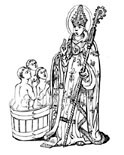
A Season of Grace, a Season of Thieves
ADVENT'S PREGNANT SILENCE
Early December. The first penance service of Advent. A young boy stands before me confessing his sins. He avoids my eyes and looks instead over my shoulder, to the statue of St. Nicholas looking down on us. The boy’s name is Nicholas, too. In a few days, on his name saint’s feast, he will awaken to find a bowl on the kitchen table, or one of his father’s work socks hung on a door frame, filled with candy, nuts, and fruit.
St. Nicholas visits the children of Osgood and leaves them treats every December 6. He is not only the patron of children but also the patron of this parish. Here the saintly bishop is honored for his kindness to children and also for assisting grownups in paying their bills. In the Plattdeutsch (Low German) of my elderly parishioners, “Nicklaas bringt dat Geld in’t Huus” (Nicholas brings money to the house).
The Advent Gospel readings may speak of a thief breaking into a home to steal, but our patronal feast remembers a bishop breaking open a shutter to throw in bags of gold to three young girls. An oddly appropriate beginning to Advent, a season of grace and a season of thieves.
I place one hand on young Nicholas’s head and the other hand on his shoulder. I speak the solemn words of absolution: “Through the ministry of the Church, may God give you pardon and peace….”
You May Also Enjoy
The Rape of the Masters: How Political Correctness Sabotages Art... The American Catholic Voter: 200 Years of Political Impact
The heavenly aesthetic of the Byzantine Liturgy is "celebrant-proof." I have never seen it done badly. By contrast, I have seldom seen the Novus Ordo done well.
Archbishop Burke Has Courage... Be Fruitful & Multiply... Pope Benedict XVI Is Ambivalent About the Second Vatican Council... "Gay" Is Good -- for Business... Msgr. Mannion Is Infatuated With the Modern World... "The Great Blunder"

